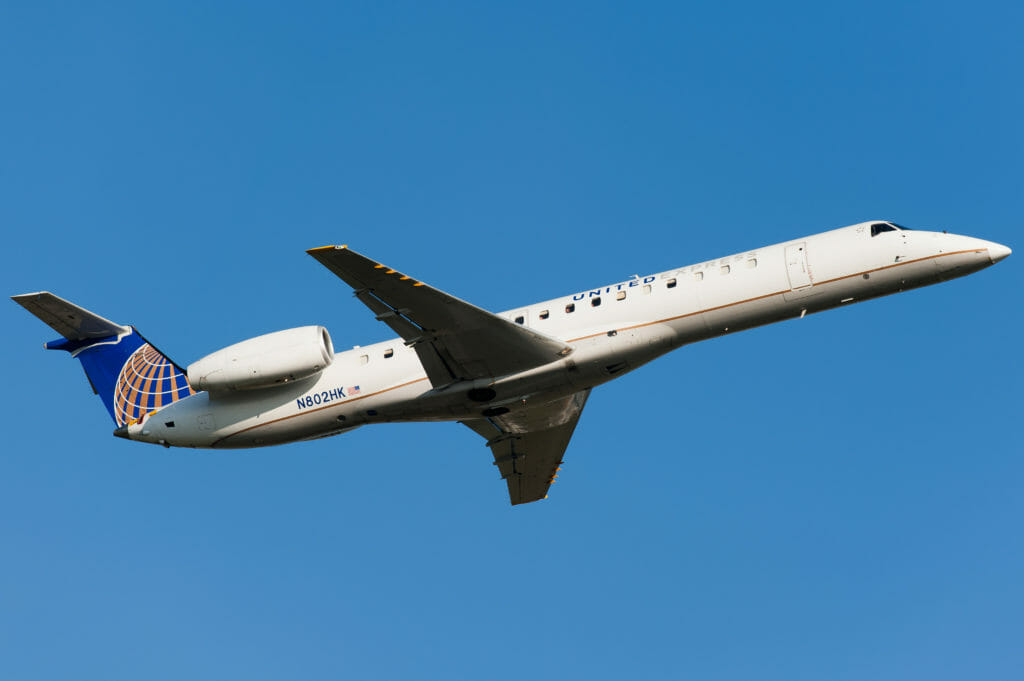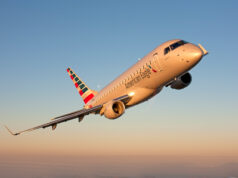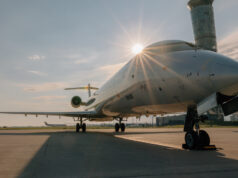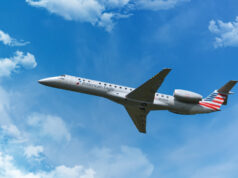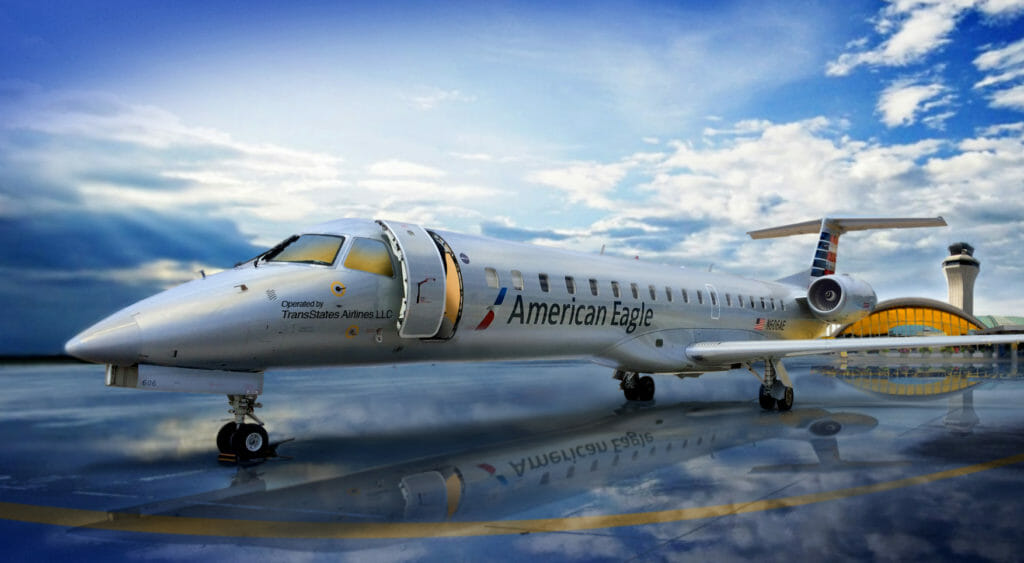
When Trans States Airlines began as Resort Air in 1982, it operated just a handful of Metro II aircraft and carried just under 7,000 passengers during its first year of operation—tourists, primarily, between its headquarters in St. Louis and a popular lake two hours south of the city (hence the call sign “Waterski,” which Trans States still uses to this day).
However, things have changed a great deal since 1982. Since that time, Resort Air has evolved from a small boutique carrier into Trans States Airlines, a carrier that served nearly 2.5 million passengers in 2014. The Metro IIs have been replaced by an all-jet fleet of Embraer 145s, and Trans States now flies on behalf of United Airlines (as United Express) and American Airlines (as American Eagle), providing service to over 70 cities in North America with approximately 237 daily flights. It has crew bases in St. Louis (STL), Chicago (ORD), Washington D.C. (IAD) and Denver (DEN), and has plans to open a fifth base by the end of 2015.
With over 30 years of regional airline experience, Trans States is one of the most venerated airlines in the business. It’s also one of the fastest growing regional airlines in the country, with 52 additional Embraer 145 aircraft scheduled for delivery between Q1 of 2015 and Q2 of 2016. Of those additional aircraft, 16 will fly as American Eagle and 36 will fly as United Express. This growth is expected to result in a staggering 93% increase in passenger traffic between 2014 and 2016, with over 4.6 million passengers estimated to fly Trans States in 2016.
Trans States Airlines is one of the fastest growing regional airlines in the country, with 52 additional Embraer 145 aircraft scheduled for delivery starting in 2015.
Trans States is currently hiring First Officers to accommodate this growth, and has been innovative in its pursuit of top-quality pilot candidates. Trans States was the first and only regional airline in the country to launch a Captain Qualified First Officer (CQFO) program, which allows First Officers who meet Captain requirements to fly as either a Captain or a First Officer, depending on the airline’s scheduling needs. CQFOs earn a Captain’s wage while flying as Captain and a First Officer wage considerably higher than that of a traditional First Officer. This program has been particularly attractive to pilots at other regionals, who have been able to launch new careers at Trans States with immediate access to the left seat. Trans States uses the CQFO program on an as needed basis, and expects to begin accepting CQFO applications again later this year.
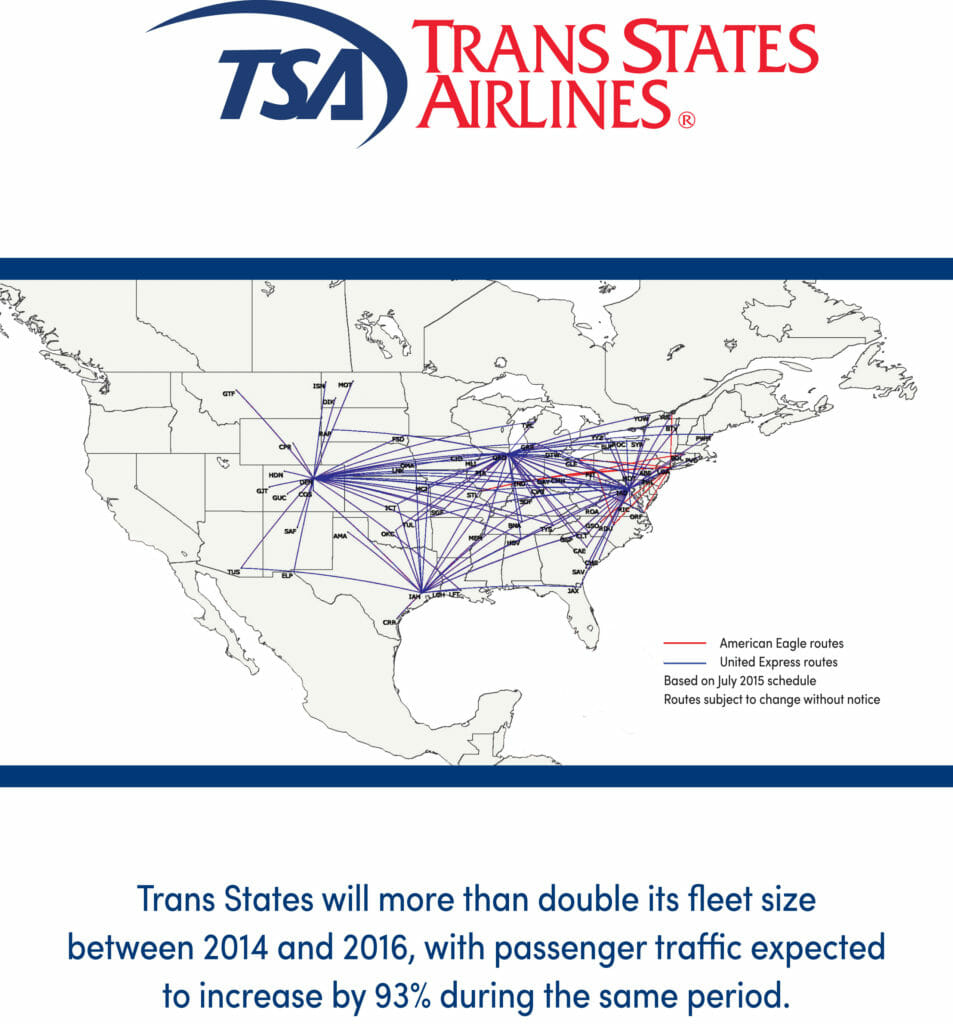
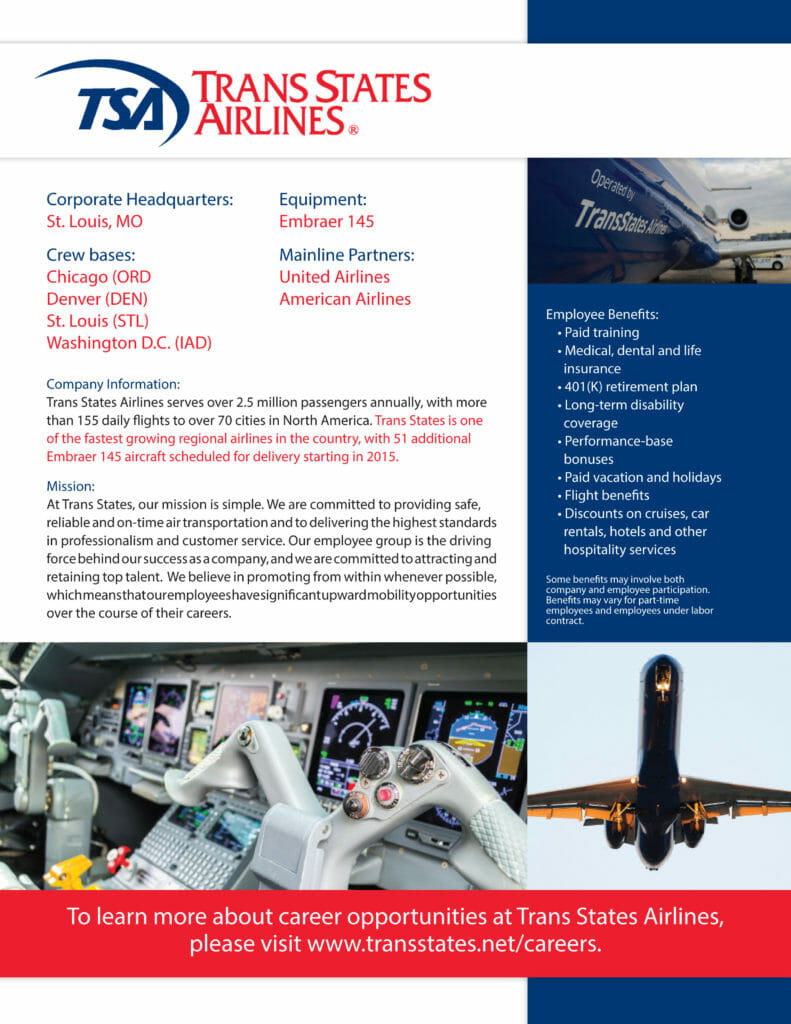
Trans States is currently offering a number of other attractive incentives to new hire pilots, including a $10,000 First Officer sign-on bonus with no training contract. Other incentives include a mentor program that allows pilots to earn an additional $5,000 for mentoring a new Trans States pilot through their first two years with the company, and a referral program that awards employees $1,500 for each pilot candidate they recommend that is hired and completes training.
Additionally, the ATP-CTP course is provided at no cost to successful applicants, and Trans States is one of just a handful of regional airlines in the country to participate in the ATP Flight School Tuition Reimbursement Program.
Trans States promotes from within whenever possible, which means that employees have significant upward mobility opportunities over the course of their careers. Other employee benefits include:
• Paid training
• Medical, dental and life insurance
• 401(K) retirement plan
• Long-term disability coverage
• Performance-based bonuses
• Paid vacation and holidays
• Flight benefits
• Discounts on cruises, car rentals, hotels and other hospitality services
Another key benefit that the Trans States pilot group enjoys is an excellent relationship with management, and maintaining that positive rapport is a top priority for the company.
Trans States is currently hiring 35-40 pilots per month and upgrades are taking place at a rate of 15-20 per month. Trans States pilots are professionally successful after leaving the company, as 83% of pilots who recently left the company were offered jobs with major carriers.
Flying for Trans States Airlines means a career with an established company that has over 30 years of regional airline experience, a positive relationship between labor and management, and a demonstrated track record of sustainable, long-term growth. To learn more about career opportunities at Trans States Airlines, please visit www.transstates.net/careers, or submit your application today via www.airlineapps.com
.
Trans States is currently hiring 35-40 pilots per month and
upgrades are taking place at a rate of 15-20 per month.
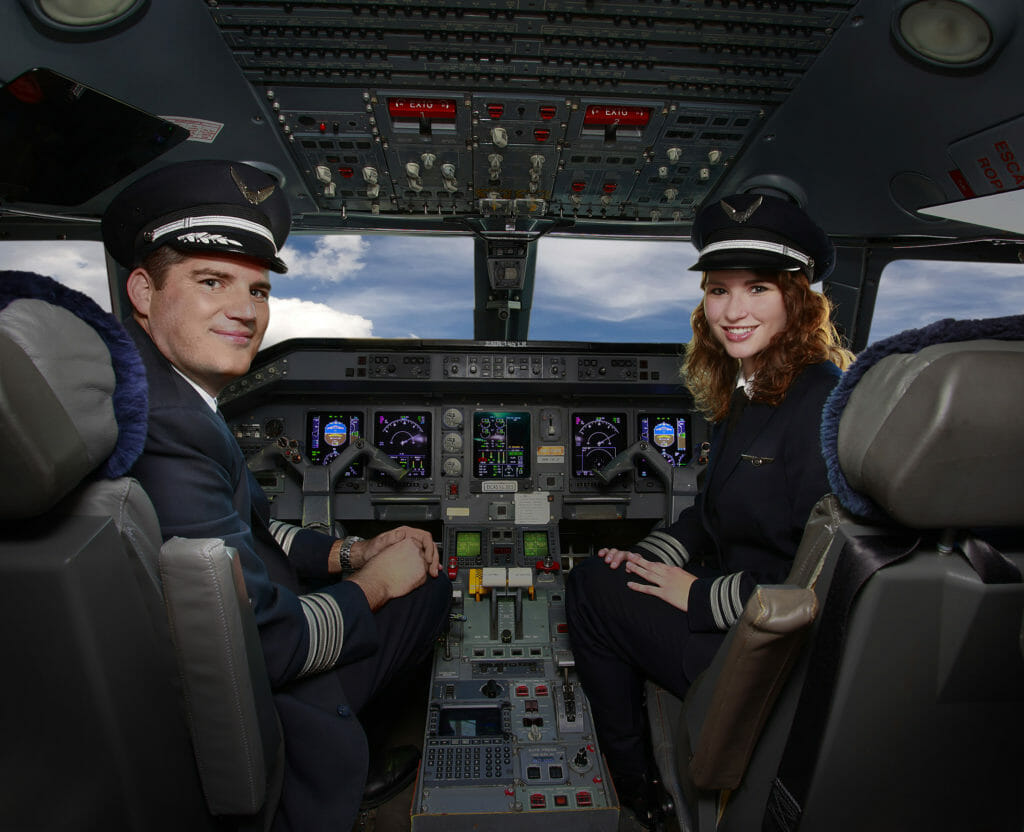
Photo by Trans States Airlines
Exclusive interview with Trans States Airlines,
Chief Pilot Lee Stelzner
Craig: How do you select applicants to be brought in for an interview?
Lee: Applicants are reviewed through their Airline App and phone screened.
C: What factors are used to screen applicants with the on-line application process?
L: Applicants are screened against hiring requirements, work history and flying experience.
C: How critical is it to attend a job fair to get an interview?
L: It may expedite the process if the job fair is close to a scheduled class date as the candidate may interview at the job fair
C: What is the best way to prepare for an interview with your company?
L: Preparation would begin with having all the requested documents organized and ready for the interviewer. He/she should also have a good understanding of IFR procedures and ability to express their aviation knowledge and experience. Pilots should be able to speak to their training record and their flying experience.
C: Do you recommend that applicants get to your headquarters city the day before and get a hotel room for the night?
L: Unless the candidate is local, it best to have a good night’s rest to be mentally ready for the interview.
C:
Can you walk me through a typical day of interviews?
L: We typically have the company presentation, logbook and document review and an interview with a recruiter and a line pilots.
C: What kind of questions can an applicant expect to be asked?
L: We want to hear examples of how applicants have handled certain situations in the past. Applicants can expect to hear questions of the “Tell me about a time…” variety.”
C: What are some of the biggest mistakes that applicants make during the interview process?
L: An applicants lack of honesty regarding their experience, training record and background.
C: Is there a written test?
L: We have a 50-question aviation knowledge test, questions based upon the former ATP written.
C: What can you recommend applicants study for that test?
L: Applicants aren’t required to study; it should be part of their knowledge base.
C: At what point is this test taken?
L: It is taken after the company presentation.
C: Do you tell applicants they are hired in person that day?
L: Most applicants will be notified within a week of their interview, at the latest.
C: How soon can an applicant expect a class date after being hired?
L: Pilots are placed in class as soon as their availability allows, we assume all candidates need to provide a two-week notice to their current employer.
C: How many pilots does your airline expect to hire this year?
L: We expect to hire 480 pilots in 2015.
C: Can you explain the ATP-AQP class that your company offers?
L: We will provide the course, travel and lodging during the course. The course is provided by one of our contracted partners. We will reimburse pilots for the cost of the ATM once submitted on an expense report with the receipt.
C: Do you have a hiring bonus?
L: At this time we are offering a $10,000.00 signing bonus to all new hire pilots.
